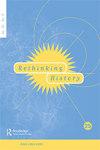克罗诺斯与凯洛斯之间的历史时间:论《凯洛斯文件宣言》的历史性,南非,1985
IF 0.5
2区 历史学
Q1 HISTORY
引用次数: 4
摘要
Chronos和kairos是希腊语中的两个词,它们表示不同的时间体验,并非完全对立,但彼此不可约。这种差异与关于历史时间的理论争论高度相关,尽管现代史学中存在时间范式的霸权。本文通过分析1985年发布的一份名为《凯罗斯文件》的南非宣言来支持这一说法。我的目的是对KD的历史性进行研究,认为该文件一方面是理解凯罗斯概念所包含的特定形式的时间经验的典范,另一方面是将时间和凯罗斯之间的差异应用于历史分析。我对KD提出了双重方法。首先,我将宣言置于其更广泛的政治、社会和知识背景下,阐述了它对时间的影响。其次,我展示了KD如何从危机和及时采取行动的紧迫性之间出现的破坏性暂时性中把握自己的历史时刻(kairos)。在这篇文章的结尾,我声称历史时间的凯洛学维度在经历危机的情况下变得更加明显。本文章由计算机程序翻译,如有差异,请以英文原文为准。
Historical time between Chronos and Kairos: on the historicity of The Kairos Document manifesto, South Africa, 1985
ABSTRACT Chronos and kairos are two Greek words that designate different temporal experiences not entirely opposed, but nonetheless irreducible to each other. This difference is highly relevant to theoretical debates on historical time, despite the hegemony of the chronological paradigm in modern historiography. This article upholds that claim by analyzing a South African manifesto titled The Kairos Document (KD), issued in 1985. My aim is to present a study on the historicity of the KD, arguing that the document is a paradigmatic case for, on the one hand, understanding the particular form of temporal experience encompassed by the notion of kairos, and on the other hand, applying the difference between chronos and kairos for historiographical analysis. I present a twofold approach to the KD. First, I situate the manifesto within its broader political, social and intellectual context, addressing as well the impacts it managed to inflict upon chronos-time. Secondly, I demonstrate how the KD grasps its own historical moment from a disruptive temporality that emerges on the threshold between a crisis and the urgency of taking timely action (kairos). I conclude this article by claiming that the kairological dimension of historical time becomes more evident in situations experienced as crisis.
求助全文
通过发布文献求助,成功后即可免费获取论文全文。
去求助
来源期刊

Rethinking History
Multiple-
CiteScore
1.20
自引率
0.00%
发文量
26
期刊介绍:
This acclaimed journal allows historians in a broad range of specialities to experiment with new ways of presenting and interpreting history. Rethinking History challenges the accepted ways of doing history and rethinks the traditional paradigms, providing a unique forum in which practitioners and theorists can debate and expand the boundaries of the discipline.
 求助内容:
求助内容: 应助结果提醒方式:
应助结果提醒方式:


